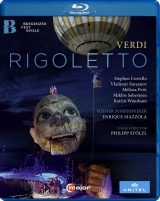 Giuseppe Verdi: Rigoletto; Stephen Costello (Duca), Vladimir Stoyanov (Rigoletto), Mélissa Petit (Gilda), Miklos Sebestyen, Katrin Wundsam, Prague Philharmonic Choir, Wiener Symphoniker, Enrique Mazzola; + Bonus: Making of Rigoletto; Regie: Philipp Stölzl; 1 Blu-ray Disc C Major 751704; Stereo & Surround: Bild 16:9; Liveaufnahme 2019, Veröffentlichung 08/2019 (149') – Rezension von Remy Franck
Giuseppe Verdi: Rigoletto; Stephen Costello (Duca), Vladimir Stoyanov (Rigoletto), Mélissa Petit (Gilda), Miklos Sebestyen, Katrin Wundsam, Prague Philharmonic Choir, Wiener Symphoniker, Enrique Mazzola; + Bonus: Making of Rigoletto; Regie: Philipp Stölzl; 1 Blu-ray Disc C Major 751704; Stereo & Surround: Bild 16:9; Liveaufnahme 2019, Veröffentlichung 08/2019 (149') – Rezension von Remy Franck
Wer sich auf diese Rigoletto-Produktion einlässt, muss wissen, dass sie bei den Seefestspielen in Bregenz aufgenommen wurde, wo die erste Sorge dem Visuellen in seiner möglichst spektakulären Form gilt.
Philipp Stölzl hat Verdis Drama vom Hof von Mantua in einen Zirkus verlegt, dessen Direktor der Herzog von Mantua ist, während Rigoletto als Clown auftritt. Die Höflinge sind Zauberkünstler, Seiltänzer oder auch nur Zirkusgehilfen. Dass dies so gut funktioniert, wie wenn der Regisseur die Handlung ins Weiße Haus verlegt hätte, leuchtet ein: Ob sexlüsterner Herzog, machtbesessener Präsident oder egozentrischer Zirkusdirektor: derart fiese Persönlichkeiten sind austauschbar, wenn es darum geht, Bösartigkeit auf ihren Paroxysmus zu treiben.
Nicht ganz so einfach liegt die Sachlage bei Rigoletto, dessen diffiziler und zwiespältiger Charakter mehr Feinzeichnung und düstere Tiefe verdient hätte als in diesem Umfeld möglich war.
Dennoch: abgesehen von einer ultra-kitschigen und geschmacklosen Donna e mobile-Szene funktioniert diese Inszenierung überraschend gut, und wer Oper primär als Unterhaltungsspektakel genießen will, kommt hier auf seine Kosten.
Die Bühne besteht aus einem fast fünfzehn Meter hohen, in alle Richtungen drehbaren Kopf. Rechts ragt eine große Hand aus dem See und hält einen hoch über dem Kopf schwebenden Gasballon in der Hand. Links gibt es eine weitere Hand, deren Finger beweglich sind und alle möglichen Formen annehmen, wobei deren Sinn nicht immer genau ersichtlich ist.
Zur Musik: Der bulgarische Bariton Vladimir Stoyanov singt die Titelpartie flüssig und vokal zuverlässig. Er erreicht sicher nicht die Charakterisierungsstärke anderer Sänger, aber in diesem Kontext ist sein Rigoletto von beachtlichem Format.
Eine Entdeckung ist die Stimme von Mélissa Petit, welche die Gilda ganz bezaubernd singt, mit schönen Koloraturen, sicherer Höhe und geschmack- und stilvoller Emotionalität.
Dem amerikanischen Tenor Stephen Costello gelingt eine gute Charakterisierung des Duca. Er singt mit genau jener stolzen Arroganz, die zu dieser Figur passt.
Alle anderen Rollen sind zufriedenstellend besetzt.
Enrique Mazzola und die Wiener Symphoniker liefern zum Bühnengeschehen einen schlanken, spannungsvollen und mit den Stimmen perfekt harmonisierenden Orchesterklang. Die Bildführung ist exzellent und fängt die spektakuläre Inszenierung bestmöglich ein.
This Rigoletto production was recorded live at the Bregenz Lake Festival, where the first concern is the visual element in its most spectacular form. Philipp Stölzl has transferred Verdi’s drama from the Mantuan court to a circus whose director is the Duke of Mantua, while Rigoletto performs as a clown. The courtiers are magicians, acrobats or just circus assistants. It is clear that this works as well as if the director had moved the plot to the White House. Whether sex-addicted duke, power-obsessed president or egocentric circus director, such nasty personalities are interchangeable when it comes to driving malice to its paroxysm.
The situation is not quite so simple with Rigoletto, whose difficult and ambivalent character would have deserved more subtlety and dark depth than was possible in this environment.
Nevertheless: apart from an ultra-kitschy and tasteless Donna e mobile-scene, this production works surprisingly well, and those who primarily want to enjoy opera as an entertainment spectacle get their money’s worth here.
The stage consists of a head almost fifteen metres high and rotatable in all directions. On the right, a large hand rises out of the lake and holds a gas balloon high above the head. On the left there is another hand whose fingers are movable and take on all sorts of shapes, the meaning of which are not always clear.
The Bulgarian baritone Vladimir Stoyanov sings the title role fluently and vocally reliably. He certainly does not achieve the characterization strength of other singers, but in this context his Rigoletto is of considerable format. A discovery is the voice of Mélissa Petit, who sings the Gilda in an enchanting way, with beautiful coloratura, sure height and tasteful and stylish emotionality. The American tenor Stephen Costello succeeds in characterizing the Duca very well. He sings with exactly the proud arrogance that suits this figure. All other roles are satisfactorily cast.
Enrique Mazzola and the Wiener Symphoniker deliver a slender, exciting orchestral sound that harmonizes perfectly with the voices. The filming is excellent and captures the spectacular production in the best possible way.






















